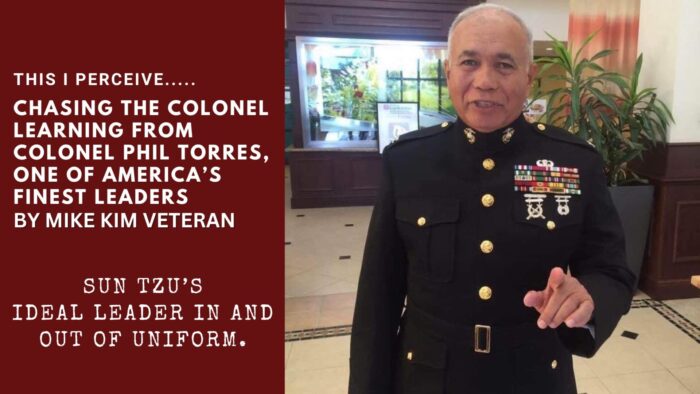This I Perceive…Chasing Colonel Sun Tzu?
Learning from Colonel Phil Torres, One of America’s Finest Leaders (Part I) Veteran Readjustment Phenomena Essay Series #6
by Mike Kim Veteran
I find the ideal helpful with actualizing my options in divergent leadership lived experiences from deep reflection. Personally, I wrestle with understanding myself in the past and present, among friends and foes. Also I am now in a position in my life, after successfully experiencing my aspirations as a professional to reflect deeply on my leadership challenges and triumphs. I can ponder on those leaders who have failed me, and others close to me. This also invites me to value examples of stellar demonstrations of leadership by others.
Sun Tzu’s The Art of War, written in the 5th Century B.C., has been widely studied by civilians and military leaders throughout the ages for success on the battlefield and nowadays, for personal and organizational development. There are many who come across the master warrior sage on the History Channel or in a training seminar for work. Sun Tzu’s strategy and tactics from The Art of War also emerge in popular culture in movies like “The Godfather” and “Wall Street.” In Chapter One of The Art of War, Sun Tzu declares the key attributes of the ideal leader: “The commander stands for the virtues of wisdom, sincerity, benevolence, courage and strictness.” Though I have deep respect for Sun Tzu, I am left with desiring more insights from these few profound words from the warrior sage from a more contemporary lens. There is a warrior with a highly self examined narrative I have been chasing for some time now; in my mind, he is the ideal warrior who reminds me of Sun Tzu.
The legendary Sun Tzu-like warrior sage is retired U.S. Marine Corps Colonel Phil Torres who epitomes Sun Tzu’s ideal leader in and out of uniform. Colonel Torres exhibited a special authentic type of service as a combat leader in the Vietnam War by participating in the historic battle of Khe Sanh during the 1968 Tet Offensive. He showed extreme valor by being awarded the nation’s third highest combat decoration, the Silver Star Medal, for actions as a Platoon Sergeant during Operation Meade River, the largest heliborne operation in Marine Corps history. The Colonel has his principles of leadership tied to his life of service, professionalism, and valor.
To me, Phil Torres’ principles of leadership–explained below, in his own words– mirror Sun Tzu’s criteria for success as a leader:
- Genuinely show respect to everyone – whether junior or senior, friend or stranger. Respect opens doors and is the grease in our social fabric to get things done.
- Nurture relationships. Good relationships are critical in getting things done and in working with other organizations.
- Clearly communicate what needs to be done and by when.
- Ensure everyone you lead has the right training, equipment, resources, and guidance to get his or her job done.
- Remove any possible obstacles or obstructions that may interfere with someone’s performance.
- Allow for individual creativity in performing a task as long as guidelines are followed.
- Be an active listener.
- Value everyone in the group or organization. Empower and make everyone in the organization a stakeholder in the outcomes and success of the group or organization.
- Recognize individual performance at every opportunity. Research, going back to the Hawthorne Studies of the 1920s, shows that recognition, above all else, motivates people to perform.
- When counseling or reviewing performance, always address performance, never attack the person. Hold people accountable for their actions and be consistent with consequences. Research shows that certainty and consistency of consequences has the biggest effect on a person’s behavior.
- Provide a clear leader’s guidance and intent purpose statement delineating where you are headed with the group or organization to include your end state goals. This is similar to providing a roadmap with a GPS destination. If people get lost along the way, they still know where they are supposed to wind up.
- Whenever I was in Command during my uniform days, I asked members of my Command to remember The 3 Rs – Repeat, Refuse, Report. If a member of my Command ever received an order or direction that was clearly illegal, immoral, or unethical, they were to ask to have the order repeated to ensure they heard it correctly. If after the order is repeated they still felt it wasn’t appropriate, they were to immediately refuse to obey the order and report the incident to the proper authorities. As a leader, always behave professionally and never insist on anyone else behaving unprofessionally.
- Learning is a lifelong endeavor. Always seek to learn so that you may continue to grow. Read as much as you can about leaders and leadership, about growth and self-improvement, and about developing and empowering others. I learned much from the series of books written by Dr. Stephen Covey, by Dr. John Maxwell, and by many other authors. One of the best books I’ve read is, “Failing Forward” by Dr. John Maxwell. Every leader fails at something throughout his or her life, but the successful leaders do not allow failure to define them. They learn from their failures and move forward. Always move forward.
- Attitude can be the biggest determinant in anything you do or fail to do. Attitude can be a force multiplier and it can also be contagious. Affect everyone with a positive attitude. Greet, compliment, smile.
- Remember that everything you do or fail to do speaks volumes about you whether or not you are aware of how you are perceived by others.
Here is a glimpse into the Colonel’s professional life. Phil Torres rose from Private to Colonel in the U. S. Marine Corps and retired after an illustrious career lasting more than 34 years of active duty. Highlights among his responsibilities included Chief of Nuclear Security Policy and Chief of Command Security for the U. S. Strategic Command, Offutt Air Force Base, Nebraska; Commander of the Marine Corps Security Force, Naval Submarine Base, Kings Bay, Georgia – responsible for one of the nation’s largest strategic nuclear weapons site in the U.S.; Advisor to the Commandant of the Marine Corps on human climate issues, Headquarters Marine Corps, Washington DC; and Inspector (Inspector General) for Marine Corps Bases Japan. He entered the Marines with a ninth grade education and retired pursuing a doctorate degree. Since retirement, he has been a Leadership and Management Consultant, a Security Management Consultant, a Team Building Facilitator, an Advisor to the Secretary of Defense on readiness issues, and an Advisor to the Secretary of Veterans Affairs on veterans issues. He is a lifelong martial artist with over 56 years in the martial arts. He currently holds the title of Kyoshi (Master) in Okinawan Shorin Ryu Kenshinkan Karate, and has practiced several styles of the martial arts to include Isshin Ryu karate, Shotokan karate, Motobu Ryu karate, Bando Kickboxing, and Jiu Jitsu. In 2014 Phil was inducted into the USA Martial Arts Hall of Fame. Phil is also a competitive shot in the action shooting sports. He competes and officiates at world, national, regional, state, and local championships across the country throughout the year. Phil is also a motorcycle enthusiast and resides in San Antonio, Texas.
Although I have read the Art of War many times, I have taken in the Colonel’s words to enhance my understanding of Chapter One of Sun Tzu’s classic military treatise. Colonel Torres’ principles stay with me because they reflect my perception of what it means to lead myself and others in and out of uniform.
Stay vigilant for more on Colonel Phil Torres and what I perceive in the next Veteran Readjustment Phenomenon Essay.
Primary Sources
Sun Tzu Art of War Institute translation Chinese to English of Sun Tzu’s 5th Century BC military treatise Art of War (9/14/2023) Sun Tzu Art of War Institute
https://suntzuartofwar.org/the-art-of-war-chapter-1-laying-plans-chinese-english/
Phil Torres’ Principles of Leadership as shared to me in his own words from a letter to me (1/15/2024).


